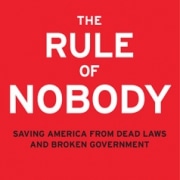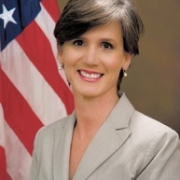How the government created the legal ecosystem for the financial crisis
Many Americans are angry that hardly any executives have gone to jail for fraud or other actions that caused the global financial crisis. In an essay in the New York Review of Books, judge Jed Rakoff gives his analysis of why federal prosecutors have not pressed charges. In part, it’s because the Federal Government itself was guilty. Judge Rakoff is the U.S. District judge for the southern district of New York – with jurisdiction over Wall Street – so he is very well placed to explain this puzzle to us.
He offers three main reasons. (I have bolded text to make his long list of causes clearer):
First, the prosecutors had other priorities. Some of these were completely understandable. For example, before 2001, the FBI had more than one thousand agents assigned to investigating financial frauds, but after September 11 many of these agents were shifted to antiterrorism work. Who can argue with that? Yet the result was that, by 2007 or so, there were only 120 agents reviewing the more than 50,000 reports of mortgage fraud filed by the banks.
But it is the second and third reasons that are most relevant to us. At EthicalSystems.org, we try to think at 3 levels simultaneously: the individual, the group, and the legal/cultural ecosystem within which companies operate. Here is Judge Rakoff’s analysis of how government policies altered the legal ecosystem, giving the green light to companies to push limits and take huge risks, while discouraging states and other regulatory actors from putting on the brakes:
But a second, and less salutary, reason for not bringing such cases is the government’s own involvement in the underlying circumstances that led to the financial crisis. On the one hand, the government, writ large, had a part in creating the conditions that encouraged the approval of dubious mortgages. Even before the start of the housing boom, it was the government, in the form of Congress, that repealed the Glass-Steagall Act, thus allowing certain banks that had previously viewed mortgages as a source of interest income to become instead deeply involved in securitizing pools of mortgages in order to obtain the much greater profits available from trading. It was the government, in the form of both the executive and the legislature, that encouraged deregulation, thus weakening the power and oversight not only of the SEC but also of such diverse banking overseers as the Office of Thrift Supervision and the Office of the Comptroller of the Currency, both in the Treasury Department. It was the government, in the form of the Federal Reserve, that kept interest rates low, in part to encourage mortgages. It was the government, in the form of the executive, that strongly encouraged banks to make loans to individuals with low incomes who might have previously been regarded as too risky to warrant a mortgage…. It was the government, pretty much across the board, that acquiesced in the ever-greater tendency not to require meaningful documentation as a condition of obtaining a mortgage, often preempting in this regard state regulations designed to assure greater mortgage quality and a borrower’s ability to repay. ..What I am suggesting is that the government was deeply involved, from beginning to end, in helping create the conditions that could lead to such fraud, and that this would give a prudent prosecutor pause in deciding whether to indict a CEO who might, with some justice, claim that he was only doing what he fairly believed the government wanted him to do.
Rakoff’s third factor is another example of how government policies can have unforeseen effects, sometimes increasing bad behavior by executives:
The final factor I would mention is both the most subtle and the most systemic of the three, and arguably the most important. It is the shift that has occurred, over the past thirty years or more, from focusing on prosecuting high-level individuals to focusing on prosecuting companies and other institutions. It is true that prosecutors have brought criminal charges against companies for well over a hundred years, but until relatively recently, such prosecutions were the exception, and prosecutions of companies without simultaneous prosecutions of their managerial agents were even rarer. In recent decades, however, prosecutors have been increasingly attracted to prosecuting companies, often even without indicting a single person. This shift has often been rationalized as part of an attempt to transform “corporate cultures,” so as to prevent future such crimes; and as a result, government policy has taken the form of “deferred prosecution agreements” or even “nonprosecution agreements,” in which the company, under threat of criminal prosecution, agrees to take various prophylactic measures to prevent future wrongdoing. Such agreements have become, in the words of Lanny Breuer, the former head of the Department of Justice’s Criminal Division, “a mainstay of white-collar criminal law enforcement,” with the department entering into 233 such agreements over the last decade. But in practice, I suggest, this approach has led to some lax and dubious behavior on the part of prosecutors, with deleterious results. I suggest that this is not the best way to proceed. Although it is supposedly justified because it prevents future crimes, I suggest that the future deterrent value of successfully prosecuting individuals far outweighs the prophylactic benefits of imposing internal compliance measures that are often little more than window-dressing.
Judge Rakoff’s essay shows the importance of bringing regulators and prosecutors into the discussion at EthicalSystems.org. Companies don’t exist in a vacuum. They compete in an arena that is partially structured by federal legislation (see our Law page), and that is refereed by government agencies subject to political pressures and crippling budget cuts. If we want to repair the game of business, we should think carefully about the best rules, insulate the rule-makers from the legalized bribery of campaign contributions, and improve the abilities and knowledge of the referees. Oh yes, and also put the worst offenders in jail, rather than just making the shareholders pay for their crimes.




